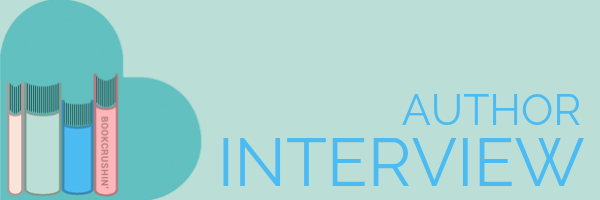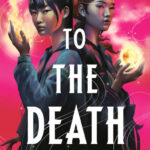
Author Interview: Fireblooms by Alexandra Villasante
Alexandra’s Fireblooms imagines New Gault, a so-called utopia where every word is monitored, and silence can cost you everything. Through the intertwined stories of Lu, a queer teen desperate to stay “safe,” and Sebas, who faces impossible choices while caring for his ailing mother, the novel explores language, safety, forgiveness, and the complicated ways trauma shapes who we trust. In our conversation, Alexandra reflects on the real-life inspirations behind New Gault’s chilling system, the nuances of forgiveness, and how queer identity deepens the search for belonging. Check out our interview below and pick up Fireblooms, out 9/30!

Fireblooms
by Alexandra VillasantePublished by: Nancy Paulsen Books
on September 30, 2025
Genres: LGBTQIA+, Speculative Fiction, Young Adult
Bookshop
Goodreads
An absorbing speculative Queer YA romance set in a town that uses technology to prevent hate speech and bullying. From the LAMBDA Award-winning author of The Grief Keeper.
When seventeen-year-old Sebastian agrees to come to New Gault to care for his absent and abusive mother after her cancer diagnosis, he is not prepared for the strange new community that awaits him or the distressing state he finds his mother in. He tries to help, but despite being ill, her tongue is as sharp as ever, finding all Sebas’s tender places. But he promised his Abuela he'd try to make this work.
Unfortunately trying also means attending TECH, New Gault’s high school. His first day, he’s assigned to enthusiastic TECH student ambassador, Lu, who introduces him to all TECH can offer—a safe space, free from bullying. But all this safety and technology comes with a catch—not only do you have to watch what you say, but you have to stay within a strict word limit. Sebas declines. To him New Gault feels more like the Stepford Wives than freedom.
For Lu, who suffers from anxiety and has a history of being bullied, TECH is a lifeline somewhere they can be safe. They can’t understand why Sebas would refuse. When Sebas rejects TECH, it feels as if he’s rejecting Lu.
But when Sebas learns if he doesn’t accept the TECH phone and abide by the rules, his mother will be denied cancer treatment, he changes his tune. Slowly, Lu and Sebas form a friendship that morphs into something more, but the closer they get, the more Sebas challenges Lu's beliefs about TECH and what it means to be safe. Meanwhile, Sebas contemplates how to forgive his dying mother for being no mother at all.
This thought-provoking, tender love story examines what we’re willing to give up to feel safe as two broken teens navigate emotional trauma and discover what blooms may come from the ashes.
Interview with Alexandra Villasante
New Gault’s word limits feel like a chilling metaphor for how marginalized people are often asked to shrink themselves to stay ‘safe.’ What real-life experiences or histories when imagining this system? How did you decide what the cost of silence would be for each character?
I think a lot about how we give up some freedoms to be, or at least feel, safe. As the daughter of immigrants, I learned code-switching early; where and when to speak Spanish and when to switch to English or lower my voice in certain public spaces where I knew it wouldn’t be welcome. That’s just one example, there are countless others.
For New Gault, I was really interested in creating a supposed utopia that is hyper-focused on controlling language as the means of keeping kids safe – from bullying, from hate speech, from their own worst choices. I knew right away what the cost of silence would be for Lu. Their family is well off and supportive and Lu has a lot of advantages when it comes to the TECH system, including being fluent in a foreign language, which TECH does not yet track. Lu is also, and this is really important, desperate to be the good queer kid, the one that doesn’t cause their family any more trouble. When Lu thinks about their gender-identity, and how it might be evolving, they clamp down hard on that, too; they want to be safe, and change doesn’t feel safe to them.
For Sebas it’s a completely different proposition. He’s in New Gault to help his mother through her cancer diagnosis; he doesn’t realize at first that the cost of helping is restricting his speech. The price of not participating in the New Gault program for Sebas is that he might be keeping his mother from life-saving medical care – which she’ll only receive if Sebas says yes to TECH.
Sebas’s journey is haunted by the impossible task of caring for someone who’s harmed him, while also navigating love and trust in a community that monitors every word. How did writing his story challenge your own ideas about forgiveness, especially for people who may never be truly sorry?
In creating this estranged mother/son relationship, I really had to dig deep into what it would mean for Sebas to choose to help his mother, fully understanding how toxic and problematic she is. I also wanted to create a parent who was terrible in a lot of ways, abusive even, but still more than one-dimensional. It was hard to not make Sebas’ mom into a cartoon villain – and to give her depth. I hope that readers will have some empathy for Sebas’ mom and the journey she’s on – while never condoning how she treats him. Forgiveness is often depicted as transactional, something sought and given, but in writing this relationship, I’ve come to understand forgiveness as a sort of internal release, a shift in perception. That’s how Sebas comes to see his mother, in a new way, at the end.
Lu’s relationship with TECH is both protective and suffocating, which makes their growing connection with Sebas feel so precarious. What did you discover about the way trauma shapes who we trust, and how does queer identity complicate or deepen that search for safety?
Safety is a relative term for everyone. It involves privilege, perception and access to communities which makes us safe (or unsafe). For a queer person that is exacerbated – holding hands with a person you love, wearing a t-shirt that signals your queerness or just moving through the world as your true self (rather than performing a proscribed gender role) can jeopardize your safety. It’s one of the things that makes Lu so fiercely loyal to TECH in the beginning of the story. They have been harmed by bullying and are grateful for the respite of not having to worry about their gender expression and their safety.
What I love about Sebas is how he challenges Lu’s perceptions of TECH just through being himself; what I love about Lu is that they let themselves be challenged and, ultimately, changed.












